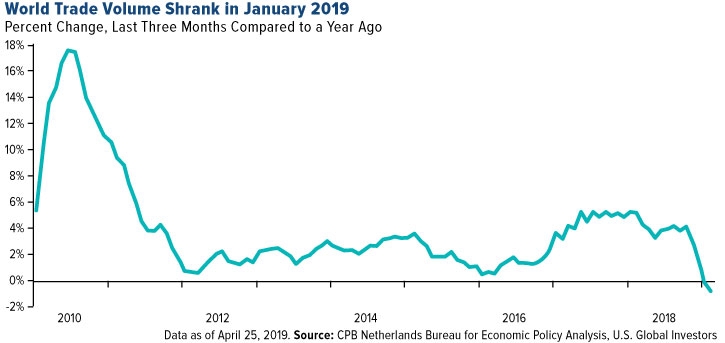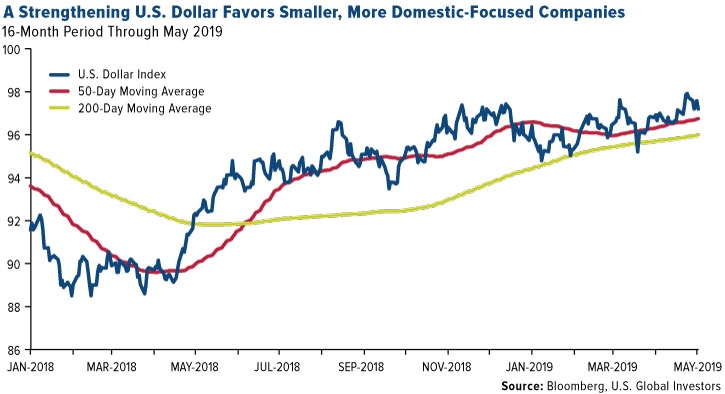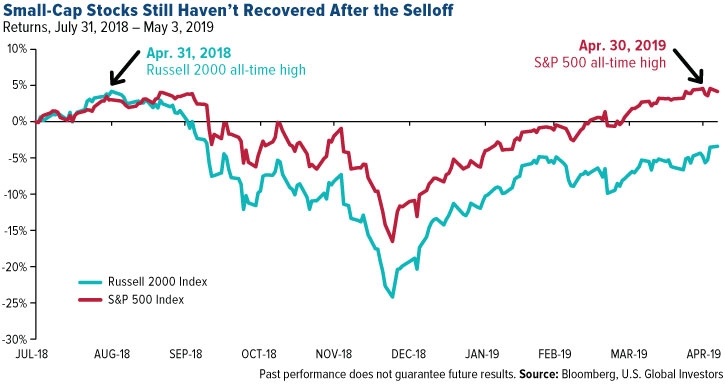The U.S. economy is growing at one of the fastest rates in the developed world right now, and unemployment hit a nearly 50-year low of 3.6 percent in April. Under normal circumstances, this should boost demand for domestic equities. Some investors, however, are hesitant to participate due to escalating trade tensions between the U.S. and China, among other factors. The latest fund flows report from Morningstar shows that investor appetite for equities has declined so far this year in favor of asset classes that are perceived to have less risk, including government and municipal bonds.
What’s more, economic data points to a slowdown in parts of Europe and Asia. The Eurozone Manufacturing PMI registered a six-year low of 47.5 in March, while China’s manufacturing sector is expanding only marginally.
This is expected to impact large U.S.-based multinationals that do a significant percentage of their business overseas. (In 2017, Intel (NASDAQ:INTC) topped the list with foreign sales accounting for 80 percent of total sales, followed by food and beverage maker Mondelez (NASDAQ:MDLZ) (76 percent) and Coca-Cola (NYSE:KO) (70 percent).)
Many investors may wonder, then, how they can get access to the robust U.S. economy and strengthening dollar while limiting their exposure to shrinking global trade and a potentially slowing economy outside of the U.S.
Time to Rotate Into Small-Cap and Mid-Cap Stocks?
A possible option could be small to mid-cap stocks, which are generally tied more closely to the domestic market than their blue-chip peers.
Not only are small and mid-caps more insulated from protectionist policies such as tariffs and stricter trade barriers, but they’re also supported by a stronger U.S. dollar. This week, the dollar tested its 52-week high, set in late April, and is currently trading above its 50-day and 200-day moving averages.
A strong greenback acts as a headwind to multinationals that do a lot of exporting, the reason being that American goods and services become more expensive to international markets.
Conversely, a stronger dollar supports smaller but high-quality, dividend-paying firms whose revenues are more likely to come from inside the U.S. than overseas. Think companies like Pool Corporation, the Clorox Company (NYSE:CLX), PetMed Express, Hawaiian Holdings and more.
A recent Wall Street Journal article supports this strategy.
“A resurgence in the dollar potentially bodes well for one group that has struggled to reclaim record territory after last year’s rout: small-cap stocks,” the article reads. It also adds that smaller companies likely stand to benefit from the Federal Reserve’s freeze on additional interest rate hikes.
We Believe Smaller Domestic Companies Look Undervalued
Indeed, small-cap stocks have not fully recovered from the market selloff in the fourth quarter, unlike S&P 500 companies. As of May 8, the Russell 2000 Index was still around 9 percent lower than its all-time high in late August. The S&P, meanwhile, rocketed back up to record levels before hitting resistance from President Donald Trump’s recent announcement that he was considering raising tariffs even higher on China-made goods.
I think this creates an attractive buying opportunity for small and mid-caps. Dollar strength and trade friction could very well prompt investors to rotate out of large-cap multinationals in favor of their smaller peers, which have a performative advantage over blue-chips anyway.
They’ve also historically outperformed large-cap stocks in most rolling 20-year periods, according to legendary investor James O’Shaughnessy, author of the essential What Works on Wall Street and The New Rules for Investing Now.
In New Rules, O’Shaughnessy writes that “a company with $200 million in revenues is far more likely to be able to double those revenues than a company with $200 billion in revenues. With large companies, each increase in revenues becomes a smaller and smaller percentage of overall revenues. Small stocks, on the other hand, have a much easier time delivering great percentage growth in revenues and earnings.”
--
Holdings may change daily. Holdings are reported as of the most recent quarter-end. The following securities mentioned in the article were held by one or more accounts managed by U.S. Global Investors as of (03/31/2019): Pool Corporation, Clorox Company, PetMed Express, Hawaiian Holdings.
The Purchasing Managers' Index (PMI) is an index of the prevailing direction of economic trends in the manufacturing and service sectors. The purpose of the PMI is to provide information about current and future business conditions to company decision makers, analysts, and investors.
The U.S. dollar index is a measure of the value of the U.S. dollar relative to the value of a basket of currencies of the majority of the U.S.'s most significant trading partners. This index is similar to other trade-weighted indexes, which also use the exchange rates from the same major currencies. The S&P 500 or Standard & Poor's 500 Index is a market-capitalization-weighted index of the 500 largest U.S. publicly traded companies. The Russell 2000 Index is a small-cap stock market index of the bottom 2,000 stocks in the Russell 3000 Index. The S&P Composite 1500 Composite is a broad-based capitalization-weighted index of 1500 U.S. companies and is comprised of the S&P 400, S&P 500, and the S&P 600.
All opinions expressed and data provided are subject to change without notice. Some of these opinions may not be appropriate to every investor. By clicking the link(s) above, you will be directed to a third-party website(s). U.S. Global Investors does not endorse all information supplied by this/these website(s) and is not responsible for its/their content.
U.S. Global Investors, Inc. is an investment adviser registered with the Securities and Exchange Commission ("SEC"). This does not mean that we are sponsored, recommended, or approved by the SEC, or that our abilities or qualifications in any respect have been passed upon by the SEC or any officer of the SEC. This commentary should not be considered a solicitation or offering of any investment product. Certain materials in this commentary may contain dated information. The information provided was current at the time of publication.



